Homer’s Iliad and Odyssey (8 vols.)
Digital Logos Edition
Overview
Perhaps the best-known and most influential of the Greek epics, the Iliad and the Odyssey stand in a class by themselves. The poems are the oldest existing works of Western literature. Their style and content played such an important role in shaping subsequent Greek culture that Homer was often called the teacher of Greece. The style of Greek used in the works has become its own form or dialect, known as Homeric Greek. Like the works of Cicero, the Iliad and the Odyssey are studied for their eloquent use of language. Innumerable works of literature, theater, and poetry have been written based on or responding to the Iliad and the Odyssey. The influence carries right up to our own day. One of the most important literary work of the twentieth century, James Joyce’s Ulysses, is a direct and intentional parallel of the Odyssey (Ulysses is the Latin version of Odysseus, the main character in the Odyssey).
This collection contains the complete texts in their Loeb Classical Library editions. Each text is included in its original Greek, with an English translation for side-by-side comparison. Use Logos’ language tools to go deeper into the Greek text and explore Homer’s elegance. You can also use the dictionary lookup tool to examine difficult English words used by the translator. If you are at all interested in the study of rhetoric, literature, or Greek—whether you’re a classical scholar who wants the convenience of Homer at a click or a student approaching Greek for the first time—Homer’s Iliad and Odyssey are musts.

Key Features
- Loeb Classical Library editions
- Extensive, in-depth indexes
Product Details
- Title: Homer’s Iliad and Odyssey
- Author: Homer
- Translator: A.T. Murray
- Series: Loeb Classical Library
- Publisher: Harvard University Press
- Volumes: 8
- Pages: 2,240
- Resource Type: Ancient Texts; Translations
- Topic: Classical Greek Literature
Individual Titles
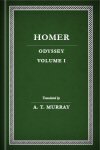
Odyssey, vol. 1
- Author: Homer
- Translator: A. T. Murray
- Series: Loeb Classical Library
- Publisher: Harvard University Press
- Publication Date: 1919
- Pages: 248
This volume contains A. T. Murray’s English translation of the first volume of Homer’s Odyssey.
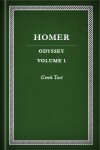
Odyssey, vol. 1: Greek Text
- Author: Homer
- Series: Loeb Classical Library
- Publisher: Harvard University Press
- Publication Date: 1919
- Pages: 248
This volume contains the Greek text of the first volume of Homer’s Odyssey.
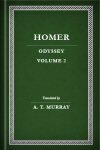
Odyssey, vol. 2
- Author: Homer
- Translator: A. T. Murray
- Series: Loeb Classical Library
- Publisher: Harvard University Press
- Publication Date: 1919
- Pages: 240
This volume contains A. T. Murray’s English translation of the second volume of Homer’s Odyssey.
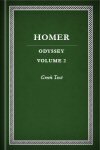
Odyssey, vol. 2: Greek Text
- Author: Homer
- Series: Loeb Classical Library
- Publisher: Harvard University Press
- Publication Date: 1919
- Pages: 240
This volume contains the Greek text of the second volume of Homer’s Odyssey.
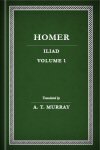
Iliad, vol. 1
- Author: Homer
- Translator: A. T. Murray
- Series: Loeb Classical Library
- Publisher: Harvard University Press
- Publication Date: 1924
- Pages: 304
This volume contains A. T. Murray’s English translation of the first volume of Homer’s Iliad.
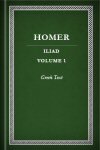
Iliad, vol. 1: Greek Text
- Author: Homer
- Series: Loeb Classical Library
- Publisher: Harvard University Press
- Publication Date: 1924
- Pages: 304
This volume contains the Greek text of the first volume of Homer’s Iliad.
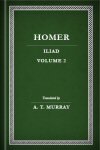
Iliad, vol. 2
- Author: Homer
- Translator: A. T. Murray
- Series: Loeb Classical Library
- Publisher: Harvard University Press
- Publication Date: 1925
- Pages: 328
This volume contains A. T. Murray’s English translation of the second volume of Homer’s Iliad.
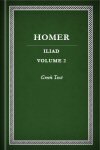
Iliad, vol. 2: Greek Text
- Author: Homer
- Series: Loeb Classical Library
- Publisher: Harvard University Press
- Publication Date: 1925
- Pages: 328
This volume contains the Greek text of the second volume of Homer’s Iliad.
About Homer
Homer (ca. 8th century BC) is the subject of intense debate regarding his life and origins. No solid biographical information exists for Homer, though legends abound. His name is related to a Greek word meaning “blind,” giving rise to the tradition of Homer as the blind bard. Many modern scholars dismiss the notion of Homer as a single author, arguing that the works attributed to him are based on many generations of oral story telling. When speaking of Homer, these scholars are referring to the date in which the works attributed to Homer were created. Some scholars suggest that Homer refers to the function of redacting oral tradition into a coherent whole.
About A. T. Murray
Augustus Taber Murray (1866–1940) was born to a Quaker family in New York City. He graduated from Haverford College in 1885 and earned a PhD from Johns Hopkins University in 1890. He also studied at the universities of Leipzig and Berlin. In 1892 he became a professor of Greek at Stanford University, where he remained for the rest of his life. He was also on the managing committee of the American School of Classical Studies in Athens, Greece, for 30 years.
Reviews
12 ratings
Evan Caddy
8/22/2019
Typos are a little more frequent than I'd like, and the fact that you can get the Greek text and a translation in the Perseus Classics Collection for free (https://www.logos.com/product/9940/perseus-classics-collection) makes me think this is mostly a waste of money. Functional as a text, though.
Pastor Reginald D. Cole
10/26/2014

Rob
8/26/2014
AeliusCicero
6/19/2014

Allen Bingham
3/5/2014

Hyuck Ju
1/9/2014

Denver Race
1/4/2014

Larry Proffitt (I
1/1/2014